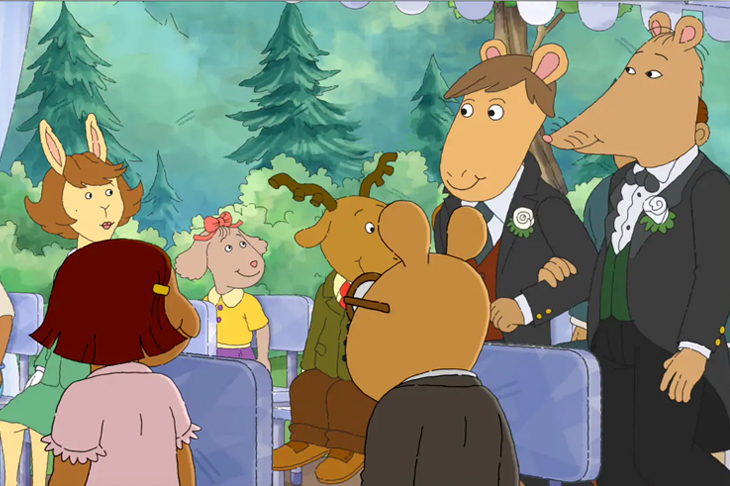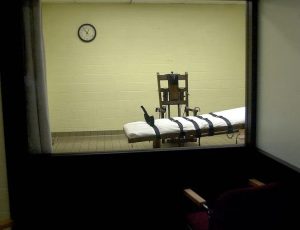‘It would misunderstand these men and women to say they disrespect the idea of marriage,’ Justice Kennedy wrote when delivering the opinion of the Supreme Court in Obergefell v. Hodges, the landmark civil rights case that legalized gay marriage. ‘Their plea is that they do respect it, respect it so deeply that they seek to find its fulfillment for themselves. Their hope is not to be condemned to live in loneliness, excluded from one of civilization’s oldest institutions. They ask for equal dignity in the eyes of the law. The Constitution grants them that right.’
Kennedy wrote those words in June 2015. Four years later, it feels like much of the country has moved on. You don’t often hear Republican candidates talking about why they disagree with the decision reached in Obergefell v. Hodges. Gay marriage is legal. That reality seems to be lost on Alabama Public Television (APT), a network that has chosen not to air an episode of the much-beloved children’s show Arthur, all because it showcased a gay wedding between a rat and and an aardvark. The non-aired episode was entitled ‘Mr Ratburn and the Special Someone’, and it showed Arthur’s teacher, gay rodent Nigel Ratburn, plighting his four-pawed troth to Patrick, the balding confectioner who runs Patrick’s Chocolates.
Explaining the decision, APT programming director Mike Mckenzie says that ‘parents have trusted Alabama Public Television for more than 50 years to provide children’s programs that entertain, educate and inspire’. He notes that ‘more importantly – although we strongly encourage parents to watch television with their children and talk about what they have learned afterwards – parents trust that their children can watch APT without their supervision. We also know that children who are younger than the “target” audience for Arthur also watch the program.’
Conservatives tend to place a lot of importance on the nuclear family structure. This makes sense: if you believe in small government, there is no better, smaller unit of governing than the family. On top of that, good parenting often creates good people — and good citizens. But good parents aren’t lazy, and they don’t expect their parenting to be done for them. Some parents, especially those who are part of religious or conservative communities, may hesitate to expose their children to certain cosmopolitan realities they don’t sanction at home. That is entirely their right. But if parents are raising their children to believe the law of the land they live in is immoral, they should expect to have to screen everything their kids read and watch, and everyone they interact with. And if they do feel that way, the state’s TV network shouldn’t be doing it for them.
None of this is to say that parents don’t have the right to raise their children as they see fit; they do. But parents who seek to impose values that counter the rights-based law of the country in which they choose to reside have no right to expect that the state or its affiliates draw their lines where the parents choose. Mckenzie justifies APT’s decision by explaining that ‘parents trust that their children can watch APT without their supervision’. Broadly, this is probably true, but parents who have a specific set of concerns should in fact not trust APT or anyone else to enforce the guidelines they’ve created for their own children. For the same reason, parents may choose whether to allow their children to view TIME magazine when its cover shows Pete and Chasten Buttigieg in Ratburn-like marital bliss.
There are obviously plenty of legal activities that don’t belong on children’s shows. It’s not illegal to have sex, to curse, or, in some states, to urinate on street corners. These are all things that do not belong on children’s programming. Had the episode of Arthur showcased gay sex between a humanized rat and a wigless aardvark, APT (and all other networks) would be entirely right to decline to show it. The same would go for heterosexual sex between consenting cartoon rats and aardvarks. But ‘Mr Ratburn and the Special Someone’ does not feature sex, only marriage, which traditionally features as little sex as possible. APT obviously does not censor heterosexual marriage, making their recent decision both disappointing and discriminatory.
Beyond all this, APT lost a real opportunity to show children that difference is not necessarily a bad thing. I’ve been quick to dismiss the left’s obsession with diversity in many a column, but at our core, we are a nation of immigrants. And if there’s a segment of the population that could most benefit from exposure to diversity, it’s children. Children’s shows like Arthur serve an important purpose in creating that exposure. From 2004-2012, kids around the country enjoyed the Arthur-spinoff Postcards from Buster. The show showcases tremendous religious, ethnic, and cultural differences, as its premise involved Buster traveling around North America meeting children from all different walks of life. That’s precisely the kind of television to which our networks should aspire.
The kids who are raised in sheltered homes will eventually grow up, get out of the house, go to school, to college, and get jobs. They’ll meet new people and be exposed to different beliefs and values, including the love of cartoon rats for aardvark chocolate merchants. Parents who want to delay that exposure should do so. State networks shouldn’t do it for them.
Daniella Greenbaum Davis is a Spectator columnist and Senior Contributor to the Federalist.


















